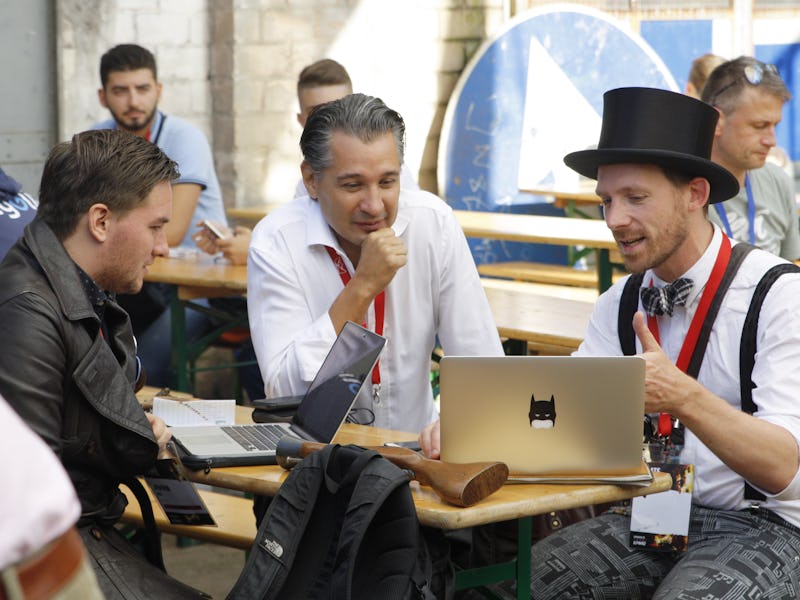As the sun beats down on the scrapyard here in Cologne, Germany, nervous tech entrepreneurs prepare to zipwire over the conference. Two ahead, a man with short hair taps the guy in front: “Excuse me, could I go first? I have to give a presentation soon.”
Tuesday kicked off Pirate Summit, a two-day tech event focused around being a pirate and grabbing the attention of big-name investors. Entrepreneurs with red lanyards mingle with investors donning green lanyards, while surrounded by beautiful scrap-metal sculptures. Attendees get a free eyepatch at the door. Speakers are greeted with “ARRR!” There’s infinite beer.
The setting is party-like, but waiting to climb the zipwire, attendees are all business. Snippets of pitches pepper the air: Todor Todorov, co-founder of HobbyEarth, tells me his social network is currently in beta while he empties his pockets of loose change. “We currently have 16 hobbies on the site, but we can expand that to 350,” he says, seconds before flying over the scrapyard on a zipline.
It seems like something of a non-sequitur, but the conference’s pirate focus taps into that wild ambition glorified in the likes of The Social Network and Silicon Valley. “Arrington was right — we’re pirates,” the conference writes in its event description, referring to Michael Arrington’s 2010 TechCrunch story about what motivates people to take that risk:
Why did some people way back in the 17th century, or whenever, become pirates? The likely payoff was abysmal, I imagine. There’s a very small chance you’d make a fortune from some prize, and a very large chance you’d drown, or be hung, or shot, or whatever. And living on a small ship with a hundred other guys must have sucked, even for the captain.
But in my fantasy pirate world these guys just had really screwed up risk aversion algorithms. Unlike most of the other people they actually lusted after that risk. The potential for riches was just an argument for the venture. But the real payoff was the pirate life itself.
“Let’s get to know other true pirates, discuss treasure maps, hire the crew and ask for money on board,” reads the conference’s mission statement
A collage of photos taken by attendees throughout the day.
Most of the first day is focused around two stages, both fitted with planks. One of these hosts the Walk the Plank challenge, where founders are challenged to pitch to a panel of investors in three minutes. The air is electric with anticipation: who will woo the money manager into funding their dream of a Tinder, but for dogs?
The events are standard fare for a tech conference. Till Faida, CEO of AdBlockPlus, talks about the future of ad-blocking at 4 p.m., before a panel of five takes over at 4.30 p.m. for an event called “Taking the Pulse of IoT.” It’s hard to say if Jack Sparrow would’ve cared about an email-checking refrigerator, but speaking to attendees, it’s clear the pirate theme is about capturing the spirit rather than literally sailing the seven seas.
“It’s not just being bold, you know?,” said Hakan Celikadam, founder of AppCide, on the morning of the event. “I mean like if you’re a founder, you’re not working a regular job, you’re hunting to find some secrets, you’re hunting to find money and gold, you’re digging for something that will help you.”
“I think it has something to do with how every startup is a pirate when they first start, because it’s like they don’t know in which legal waters they are,” said Boyan Markov, a crew member for Pirate Summit. “It has a certain pirate feel to it, because you take what’s yours and achieve what you want.”
Pascal Grüttner, founder of delivery company James-Box, came to the summit for the second year in a row looking for investors. He came dressed in full pirate gear, one of the few going all-in with the theme.
Pascal Grüttner, founder of James-Box.
For Grüttner, the pirate theme is key to getting people to mingle and break the ice. It’s easy to see why this is needed: the event is potentially one of the biggest moments of people’s careers. “All the barriers between investors, startups and all the other people here get lost,” he said. “You talk to each person, and you get in contact with one ‘hello,’ or better yet, one ‘ARR!’.”
As the day comes to its close, the winners of Europe’s hardest startup competition are announced. Trustful, a blockchain-based voting system, was built on a bus traveling at 50 miles per hour for 72 hours. It sounds intense, but team designer Viktor Nyics is over the moon at his team’s success.
“It’s, as they would say, frickin’ amazing, to keep it nice and gentle!” Nyics tells me.
It’s a fitting reminder that people are here to make their startup dreams come true. These are the people willing to sit in a cramped space for three days, give up sleep, and push themselves to the limits just to make it work. With this spirit of abandon in mind, maybe the pirate theme isn’t so strange.
